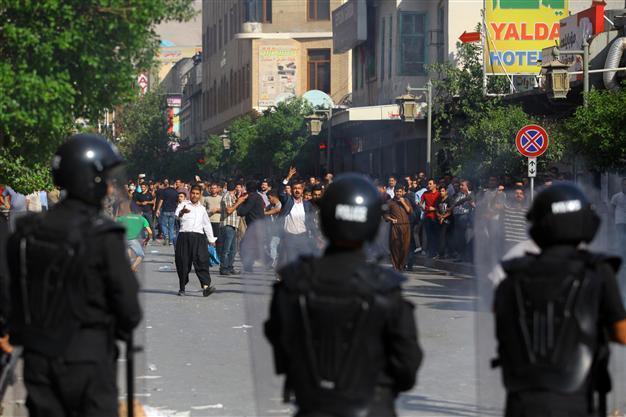UN urges Iraq's feuding Kurds to respect democracy
BAGHDAD - Agence France-Presse

Protesters shout slogans towards security forces during clashes in Sulaimaniyah, in Iraq's Kurdistan region, on October 10, 2015. AFP Photo
Political parties in Iraq's Kurdish region, whose president's mandate expired in August, should respect democratic principles, the top UN envoy said on Oct. 14.Jan Kubis' warning came after a week that saw protests against regional president Massud Barzani turn violent and the leading opposition party kicked out of government.
What started as demonstrations over unpaid salaries in regions dominated by the opposition to Barzani's Kurdistan Democratic Party (KDP) escalated into protests demanding he step down.
At least four people were killed, dozens wounded and local offices of the KDP in several southern towns were burnt down.
"Perpetrators of these acts of violence should be quickly brought to justice, following due judicial process," Kubis, UN chief Ban Ki-moon's representative in Iraq, said in a statement.
But he also stressed that all parties in the northern autonomous region, a key partner in the global fight against the Islamic State of Iraq and the Levant (ISIL), should respect democracy.
Kubis urged "the authorities and political forces of the region to ensure the proper functioning of the political system and its institutions, political parties and their offices, in full conformity with democratic principles and methods."
Barzani's mandate expired in August but the 69-year-old, at the helm of Iraqi Kurdistan since 2005, wants to stay in power, arguing that his leadership is needed to fight terrorism.
Negotiations between the parties sharing power have failed.
Barzani's camp accused Gorran, the second-largest party in Iraqi Kurdistan, of instigating the protest violence.
The KDP subsequently blocked Gorran's leaders, including the parliament speaker, from reaching their workplace in the regional capital Arbil and declared the party to be out of government.
The resurfacing of geographical and linguistic divisions has raised the spectre of the civil war of the mid-nineties that split the region into two entities administered separately for years.
















